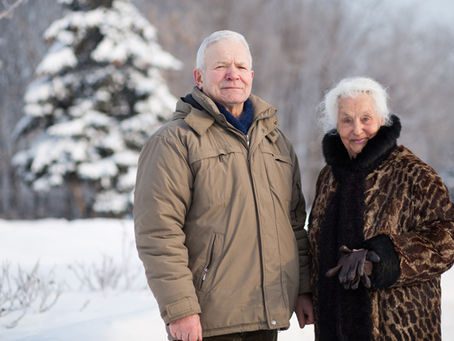The hazards of winter weather affect seniors more than any other demographic. While we’re all affected by bitter cold, snow and ice, the dangers our seniors are exposed to are very real for those of us who are caregivers, or just concerned family members. But the good news is, with a little planning and preparations, it doesn’t have to be scary time of year.
Snow, Ice and Cold Temps
The weather itself is certainly the most obvious danger of winter. Here are a few other hazards to be aware of:
- Falls. Be sure the seniors in your life have appropriate winter shoes with good soles and traction. The injuries from falls are among the highest need for emergency room visits among seniors each year.
- Driving. It’s best for seniors to avoid driving during the winter if possible. If they do drive, be sure they feel confident facing winter road dangers, including steering through icy conditions and snow. Also, make sure they are equipped with proper winter tires.
- Hypothermia and Frostbite. Did you know that nearly 50% of all cases of hypothermia-related deaths occur among seniors? They can face this risk even inside the home, so remember that seniors are more vulnerable to cold air, and set thermostats to always be higher than 65 degrees.
Dementia and Sundowning Syndrome
You might not have heard of it, but sundowning is a condition that can cause confusion and agitation. It can even can cause loss of memory. It happens as a result of lower daylight hours because our own natural body rhythms get disrupted when we aren’t exposed to enough light. This is very common in the northern regions of the country. Alzheimer’s Disease and dementia can often be exacerbated by these conditions.
To lessen these impacts, be sure seniors have a structured routine they can stick to so their bodies will know when to rise and when to rest. When possible, be sure to allow ample sunlight into the home, and create a warm atmosphere with soft lights.
Combatting Flu
Don’t be fooled by how “common” the flu can be! Even strong seniors who feel great need to be vaccinated as early as they can before flu season starts. The dangerous part of the flu among seniors is the complication of pneumonia and other respiratory conditions. The flu is a real threat and causes many deaths every year. Take the proper precautions!
The Winter Blues
This is also known as SAD, or “Seasonal Affective Disorder.” This too is a result of very little daylight, and can cause severe mood swings and lack of energy. It’s common in the northern states where daylight is scarce during the winter, but can certainly happen anywhere. Be sure to allow natural light in the house and if needed, seniors should also avail themselves to light therapy. Full spectrum lights can easily be purchased and are a very useful tool in combatting the effects of winter blues. Seniors who are struggling with depression should seek medical assistance immediately.
Social Isolation
All of the things we’ve already mentioned can result in seniors withdrawing from life. They may choose not to participate in their favorite activities and remain at home for too long without having social interaction. If you have a senior loved one, be sure they have lots of visits from family and friends, and organize outings so they can get out of the house. Keeping them occupied with things like going to church or visiting a senior center can go a long way in keeping them emotionally healthy. Transportation can always be arranged if they aren’t able to go themselves.
Remember, our seniors face different challenges than many of their younger friends and family. Keep in mind all of these tips as they go through the winter months and you’ll find that they are much healthier and happier for it!
For more information on seniors dealing with winter hazards, please contact Waterfall HomeCare today.

